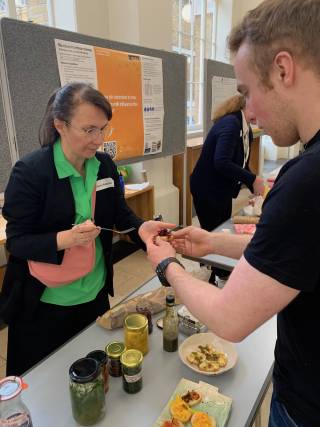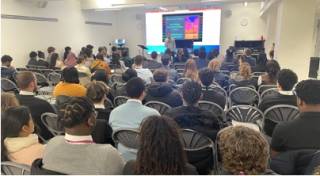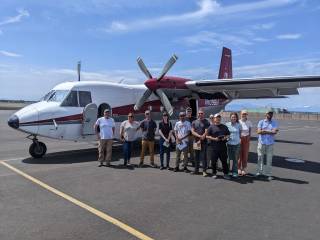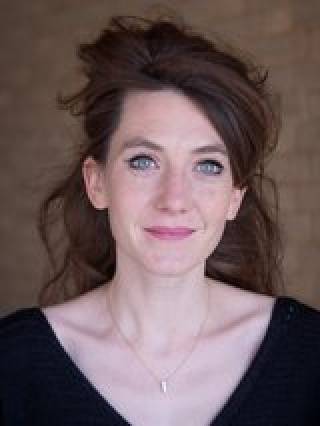A key aim of the IRDR is to engage in public debate on issues in risk and disaster reduction, creating a space for academic discourse in the public policy and political arenas, and raising the profile of UCL. To achieve this, we organise discussion meetings, lectures, symposia and conferences open to the UCL community and the general public, cumulating in our Annual Conference. As well as our event series, we organise workshops with local communities as part of our research projects, participate in external public engagement events, and our academics feature in the media
We look forward to an exciting events programme in 2023–24, starting with ‘Gender and Sexual Minorities in Disaster Risk Reduction’, ‘Risk, Sustainability and Green Finance,’ and ‘Modern Slavery in the UK’.
Events in 2022–23
The 2023 Annual Conference – on the theme of 'Risk Without Borders' – saw Professor Stefan Dercon from the Blavatkin School of Government, Oxford and former Chief Economist of DFID give the keynote speech and Judge Mykola Gnatovskyy, European Court of Human Rights, in conversation with Dr Yulia Ioffe. Panel discussions on data and scientific work across borders included experts from the British Geological Survey, University of Twente, The Economist, the European Centre for Medium-Range Weather Forecasts, Tohoku and Bristol universities, as well as IRDR and UCL academics.
Our Humanitarian Summit – 'Doing Even More with Even Less' – organised by Dr Lisa Guppy, welcomed Claudia Wells, International Hub Director, Development Initiatives, as the keynote speaker. A policy and frameworks panel discussion and an in conversation session included experts from University of Tromsø, Norway, Islamic Relief Worldwide, Elrha, the UN Resident Coordinator’s Office and UCL.
We also welcomed sector experts onto campus as part of our free, public Monthly Seminar series. Speakers included Paul Ingram from the Centre for the Study of Existential Risk, University of Cambridge, who gave an introduction to the latest research on the global effects of nuclear war; Tom Sheldon from the Science Media Centre on communicating science research; and international members of the GRRIPP project who led a discussion on gender, climate change and sustainable development. As part of this series, we were also fortunate to have inaugural lectures from two new members of staff. Prof Fatemeh Jalayer spoke on engaging communities in multi-risk governance and Prof Mark Pelling on engaging with the political spaces of adaptation and risk management.
In December, we held the first IRDR debate, in partnership with visiting academic Chris Needham-Bennett from consultancy Needhams 1834, on the festive question of whether the risks of Christmas outweigh the benefits. The topic prompted speakers to discuss an array of topics including climate change, migration, community resilience, hazard, warnings and emergency response, as well as an array of more comical topics in the spirit of the theme. You can read the subsequent blog post about the event on the IRDR website.

Most IRDR events are free to attend and open to the public. Many are recorded and available on the IRDR YouTube channel.
Catch up now:
- Annual Conference – Risk Without Borders (June 2023)
- Humanitarian Summit – Doing Even More With Even Less? (June 2023)
- Centre for Gender and Disaster GRRIPP: Gender, Care and Livelihoods in times of crisis (February 2023)
- Centre for Digital Public Health in Emergencies Anniversary Event (May 2023)
- Centre for Gender and Disaster GRRIPP: Gender, Climate Change and Sustainable Development (May 2023)
Widening participation and outreach
Part of ensuring department community remains diverse is making sure our academic programmes are available, and appeal to, a wide range of academically excellent students. As part of UCL’s broader widening participation (WP) remit, the IRDR hosts online taster events, bespoke school visits and careers events. This year we hosted secondary school pupils from East London at the UCL East campus for a summer school held in partnership with the London Legacy Development Corporation.


In December, Communications and Digital Content Manager Sarah Jeal won a UCL Widening Participation Community of Practice award for Schools and Community Outreach in recognition of her role in expanding the department’s WP activities.
Media engagement
The IRDR maintains a high-profile media strategy, providing both immediate comment during disasters, and features for documentaries and magazines.
The earthquakes in Turkey and Syria in February meant IRDR experts were in demand, with Prof Joanna Faure Walker appearing in global outlets such as the BBC (UK and international), Financial Times, World Bank, NewsWeek, Euronews, Reuters, The Financial Express, Science Media Centre, Wellington Weekly News, Zee News, AviationSource News, Sky NEWS, Talk TV, and CNBC-TV, amongst others.
Other media appearances included an interview with Dr Yulia Ioffe on Ukraine’s investigation of Belarus’ suspected role in the transfer or children; Prof Ilan Kelman on reducing lives lost to extreme weather; Prof Joanna Faure Walker on the Morocco Earthquake; Dr Philip Cunliffe on the influence of chatgpt; Dr Gianluca Pescaroli on how financial institutions prepared for winter power shortages; and Prof Joanna Faure Walker on how to reconstruct after disaster strikes, amongst many others.
Dr Mohammad Shamsudduha's research on farmers replumbing groundwater in Bangladesh was picked up globally by US radio channel Science Friday; The Business Standard, Bangladesh; Daily Star, New Scientist, and Yahoo Finance (see Research section for more details).
 Close
Close


